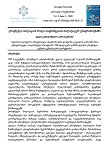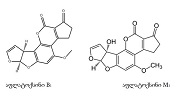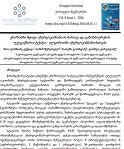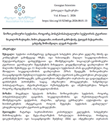Religion in the Information Society
(Sociological Etude)
Downloads
The main central questions asked in the article are the following: Is the role of religion belittled in the contemporary information society? If culture turned into mass-culture, is it possible that the same fate awaits religion? If it is so and religion will lose its significance for and influence on society, then what final result will this process bring? Are we moving towards an areligious society? But if the processes go vice-versa,they can evoke an opposite reaction and traditional religions will fill with fresh energy and begin a full-blooded life. According to the authors of the article, an information space is simply a superficial cover of man’s spiritual life. That is why a virtual cyber-church will never replace a real temple. It is a parody and simulation of a real church. And the day will come when man escapes from the slavery of this simulation and virtual reality and will return to the eternal truth and genuine religious faith. It seems that man enfeebled by the illusion of pseudo-religion and pseudo faith has a serious exam to pass.It can be easily seen that pseudo-religion which is constructed in the artificial virtual space has no future and that any experiments in this sphere are, from the very beginning doomed to failure. Religious life means a live communication with the transcendent and it is lost in the case of virtualization. The internet can be a fine means for spreading the word of God, but it (Internet) has its own rules of speech that are not relevant for the language of the divine service. We think that a digital expression of religion is absurd and nothing more.
Downloads
Masionis J. (2004), Sociology, M. (in Russian).
See about it: K. Calhoun, D. Licht, S. Keller, (2008), Sociology, Tb. 2008. Ch.13. Religion, (in Georgian).
Bodrillard J. (1997), „Simulated and Simulations”, Tb. (in Georgian).
Toffler E. (2002), Future Shock, M. (in Russian).
Bodrillard J. (2000),, America., S-P. p. 36 (in Russian).
Challenge of Modern Society. Letters of Juergen Habermas and Joseph Ratzinger. (2010), Tb. (in Georgian).

This work is licensed under a Creative Commons Attribution-NonCommercial-NoDerivatives 4.0 International License.


























































































































































































































